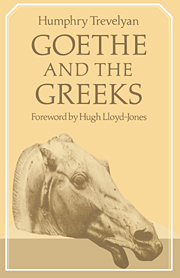CHAPTER II - FROM HERDER TO WEIMAR (SEPT. 1770–NOV. 1775)
Published online by Cambridge University Press: 15 December 2009
Summary
“Die Riesengestalten der markigen Fabelwelt.”
KNOWLEDGE
Early in September 1770 Johann Gottfried Herder came to Strassburg and stayed until April of the following spring. He was five years older than Goethe, and had already made himself a name in Germany as a powerful critic and an original thinker. Goethe called on him as soon as he heard of his presence in the town, and continued to visit him throughout the winter until shortly before Herder left. The relationship that grew up between them, finely and vividly described in Dichtung und Wahrheit, was one of the most fruitful for Goethe of all the many that enriched his long life. Herder's influence in fact during the winter of 1770–1771 was of decisive importance in the development of Goethe's genius. Herder was the champion of those new ideas which were spreading to Germany from France and England. With Rousseau and Blackwell he rejected the overlordship of the intellect and hailed feeling as the primary guide and judge. In poetry or art only that was great which was true to nature or sprang from the depths of instinctive consciousness. A folk-song, a Scotch ballad were greater in their artless truth than all the tragedies of Voltaire; and Homer was supreme because he sang the life that he saw around him, and used only the inspiration of his genius to give his song artistic form.
- Type
- Chapter
- Information
- Goethe and the Greeks , pp. 50 - 83Publisher: Cambridge University PressPrint publication year: 1981



